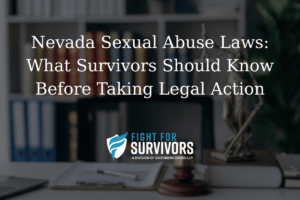
Understanding Sexual Assault Laws in Nevada
Survivors of sexual assault in Nevada face not only the trauma of their experience but also the challenge of navigating the legal system to seek justice. Whether the crime occurred recently or in the past, survivors have legal options, including filing criminal charges, pursuing a civil lawsuit, or seeking financial compensation for their losses.
Nevada law provides protections for sexual assault survivors, ensuring they have the right to hold abusers accountable. Knowing the laws, the statute of limitations, and the steps involved in both criminal and civil cases can help survivors make informed decisions about legal action.

Defining Sexual Assault Under Nevada Law
Sexual assault in Nevada is defined as any non-consensual sexual penetration. This includes cases where a person’s consent was not given due to force, threats, intoxication, or incapacity. Nevada sexual assault laws also classify certain sex crimes, such as rape and child molestation, as felonies, leading to severe legal consequences for offenders.
Common examples of sexual assault crimes include:
- Rape or forced sexual penetration
- Sexual misconduct involving minors
- Non-consensual sexual activities where drugs or alcohol were used to impair the victim
- Assaults occurring in positions of trust, such as teachers, clergy, or employers
If someone has been sexually assaulted in Nevada, they have options to report the crime, seek compensation, or take legal action against the abuser.
The Criminal Justice Process for Sexual Assault Cases
For survivors seeking justice through the criminal justice system, the process typically begins with filing a police report. Law enforcement will investigate the allegations, which may include gathering evidence such as DNA evidence from a rape kit, medical reports, and witness statements.
Filing Criminal Charges
Contact Us For A Free Legal Consultation. No Fee.
Call (833) 55-FIGHTOnce law enforcement completes its investigation, the case may be referred to the district attorney’s office for criminal prosecution. In a criminal trial, the prosecution must prove beyond a reasonable doubt that the assault occurred. If convicted, the offender may face significant prison time, mandatory registration as a sex offender, and other penalties under Nevada law.
Statute of Limitations for Criminal Cases
Nevada has specific time limits for filing criminal charges in sexual assault cases. In some situations, there is no statute of limitations, meaning charges can be filed at any time. Survivors should consult legal counsel to understand how the statute of limitations applies to their case.

Civil Lawsuits for Sexual Assault Survivors
In addition to criminal prosecution, survivors can pursue justice through civil litigation. A civil lawsuit allows survivors to seek compensation for emotional distress, medical expenses, lost wages, and other damages. Unlike a criminal case, where the goal is to convict the offender, a civil lawsuit focuses on holding the perpetrator and any liable institution financially accountable.
Who Can Be Held Liable?
In Nevada sex abuse lawsuits, liable parties may include:
- The perpetrator of the assault
- Institutions or employers that enabled or ignored abuse
- Organizations such as the Boy Scouts or religious groups if they failed to protect victims
Time Limits for Filing a Civil Lawsuit
The Nevada statute of limitations for civil cases involving sexual assault has been extended in recent years, giving survivors more time to file claims. Even if the abuse happened years ago, survivors may still be eligible to recover compensation. Consulting a legal team experienced in Nevada sexual assault cases can help determine eligibility.
Seeking Compensation and Support
Many survivors experience long-term emotional trauma and financial hardships due to sexual assault. Pursuing legal action can help recover damages for:
- Medical bills related to treatment or therapy
- Emotional distress and psychological counseling
- Lost wages due to the inability to work
- Other financial losses resulting from the assault
Gathering Evidence for a Legal Case
To strengthen a sexual assault case, survivors should consider gathering evidence, such as:
- Medical records and rape kit results
- Police reports and written reports from law enforcement
- Witness statements from people who may have knowledge of the crime
- Any communication from the perpetrator that may indicate guilt

How Survivors Can Move Forward
Many survivors struggle with fear, shame, and uncertainty after an assault. It’s important to seek emotional support through counseling, support groups, or legal representation that prioritizes survivor well-being. Understanding Nevada sexual assault laws and working with a qualified legal team can help survivors make informed decisions about their path to justice.
Frequently Asked Questions
1. How long do I have to file a sexual assault case in Nevada?
The statute of limitations varies depending on whether the case is criminal or civil. Some cases have no time limit, while others must be filed within a certain number of years. Legal counsel can provide guidance based on individual circumstances.
2. Can I file a civil lawsuit if my abuser was never convicted?
Yes. A civil lawsuit does not require a criminal conviction. The standard of proof in civil litigation is lower than in a criminal trial, making it possible to hold an abuser accountable even if criminal charges were not filed.
3. What should I do if I was sexually assaulted in Nevada?
If possible, seek medical attention, document what happened, and consider filing a police report. Survivors should also consult with a legal team to understand their options for pursuing justice.
4. What compensation can I seek in a civil lawsuit?
Survivors can seek financial compensation for medical expenses, therapy, lost wages, and emotional distress caused by the assault.
5. Can I sue an organization if the assault happened under their supervision?
Yes. Institutions that failed to prevent sexual abuse or knowingly allowed it to occur can be held liable in a civil lawsuit. Examples include workplaces, schools, religious institutions, and youth organizations.
For survivors of sexual assault in Nevada, taking legal action can be an important step toward healing and justice. Understanding the laws and seeking professional guidance can empower survivors to reclaim their rights and hold abusers accountable.
Experienced Attorneys Who Will Listen And Fight For You
Speak To An Attorney Now »